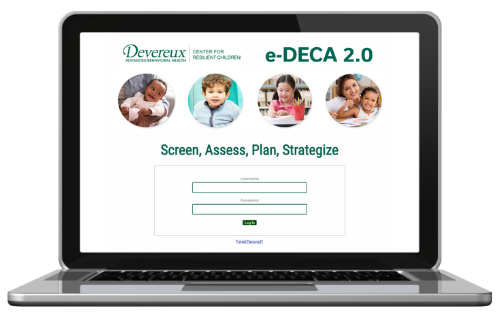
The e-DECA is a web-based platform for use of the Devereux Early Childhood Assessment (DECA)! And it’s much more than that. The DECA Program is focused not only on promoting the resilience and social and emotional health of young children, but of the adults caring for them too. The Devereux Center for Resilient Children (DCRC) understands and appreciates that there are many tools and resources out there with the same goal, which is why the e-DECA offers resources designed to help you connect the DECA Program with what you’re already using. There’s plenty to love about the e-DECA, but right now, we’ll share just 11 things to love.
- Both teachers/professionals and parents/family members can complete a DECA. Young children are supported by adults in both the home environment and classroom/care settings. It is DCRC’s recommendation and hope that a child is assessed by a teacher and a parent, and that the teacher and parent work in partnership to promote resilience in and support the social and emotional development of that child.
- The scoring and report generation is done for me. Manually scoring? No, thank you! The e-DECA does it all for me, plus, it generates a multitude of reports. I can access reports for an individual child and for an entire group/classroom.
- Strategies, galore! When it’s time to create a plan based on the results of a DECA, there are numerous strategies I can choose from to try out, to help a young child grow their social and emotional development. While I use the standard e-DECA and access the DECA Program strategies, I know that there is another version where I could access strategies from Conscious Discipline. If my team were using Conscious Discipline practices, I would definitely use that version of the e-DECA, so that I could use the DECA to assess the impact of said practices!
- A focus on myself. I love the fact that I can use the e-DECA to focus on my own resilience and social and emotional health! The platform allows me to fill out a Devereux Adult Resilience Survey (DARS), and then it provides strategies that will help me promote my own resilience. As DCRC always says, “resilient children need resilient adults,” and so it’s wonderful that I can use the e-DECA to support myself as well as the young children in my care!
- Reflecting on my teaching practices. Since I use the DECA-P2 for preschool children, I also have access to the Devereux Reflective Checklist, which I can complete within the e-DECA as well. This checklist helps me reflect upon and intentionally use practices that promote children’s social and emotional health, by nurturing their within-child protective factors of initiative, self-regulation, and attachment/relationships. The checklist helps me focus on the daily routines, environment, caring connections, and activities and experiences I provide, as well as on my partnership with parents/families.
- Spanish-translations available. Within the e-DECA, you can access the DECA in both English and Spanish, and you can also print out strategies reports in English and Spanish. This is extremely helpful when working with Spanish-speaking families!
- The Help Resources. Should I ever need assistance with something, there are many resources accessible within the e-DECA. There are manuals and guides, and there’s a video demo for pretty much every single action you can do in the system. It’s wonderful to have help and directions be so accessible!
- Being able to email DECAs. It’s not a problem if I am unable to see a parent/family member in person so they can complete a DECA. I can email them! The e-DECA allows me to send an email to a parent/family member, which includes a link to an online DECA for them to complete for their child! Should I ever need a colleague to complete a DECA, and they’re not an e-DECA user, I can also email them.
- Head Start resources. The DECA Program aligns with the Head Start Early Learning Outcomes Framework, and you can access alignment resources whenever you’re selecting strategies for a child! It displays how DECA Program strategies align with the various goals of the framework. What a wonderful way to help Head Start professionals! *This is not accessible to those using the Conscious Discipline version of the e-DECA.
- Pyramid Model resources. Also accessible when selecting strategies for a child are numerous Pyramid Model resources! They are attached to specific strategies, so I know what resources I can access to help me put the strategy into action. This is just another example of the DCRC team understanding that those working with young children are using different tools and resources, and it’s so helpful to see how they all connect and support each other.
- Rigorous, Relevant, and Reasonable. Finding a tool that is nationally standardized, reliable, and valid, while also being so practical and user-friendly, makes the e-DECA invaluable. Knowing that the tool is evidence-based and can be completed in under five minutes makes it a realistic option for almost any program. We need tools that reflect the reality of time constraints and provide solid information that can benefit children and the adults caring for them right away.
Remember that these are just 11 things to love about the e-DECA. There’s more to love, and if you want to find out what, then click here to learn more.
February 19, 2024


